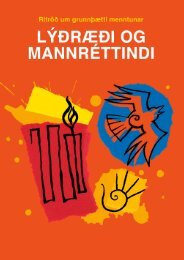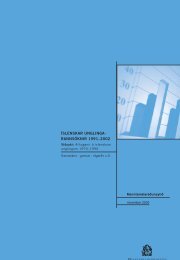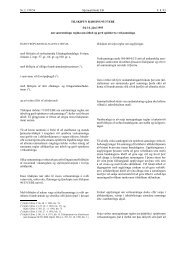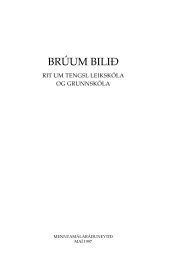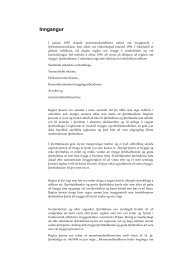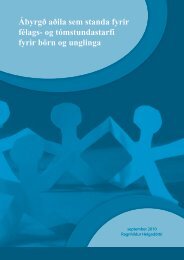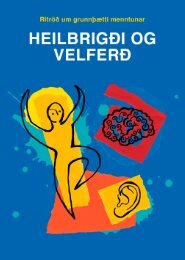Arts and Cultural Education in Iceland : Professor Anne Bamford
Arts and Cultural Education in Iceland : Professor Anne Bamford
Arts and Cultural Education in Iceland : Professor Anne Bamford
Create successful ePaper yourself
Turn your PDF publications into a flip-book with our unique Google optimized e-Paper software.
Before I came here no-one was do<strong>in</strong>g theory classes but now it is like a rule. If you are over 10 years of age you have<br />
to do a theory class. Some of the pupils are not happy with that, they do not want to take the exam as they do not<br />
want to do theory. I th<strong>in</strong>k this is a real issue about theory <strong>and</strong> practice. The pupils have to take an exam <strong>and</strong> get a<br />
certificate; some just get a certificate with a grade <strong>and</strong> comments. The letters with the grades <strong>and</strong> comments go home<br />
to the parents. We have external exam<strong>in</strong>ers that come to the school.<br />
We want more cooperation with the compulsory school <strong>and</strong> we would like to work dur<strong>in</strong>g school. I th<strong>in</strong>k it would be<br />
better for everybody if the music lessons were dur<strong>in</strong>g school as by the time the children get here they are very tired<br />
<strong>and</strong> do not want to learn their <strong>in</strong>strument as they have had a full day of school. But we need to plan a new music<br />
school that would go alongside the elementary school. Many students have gone abroad once they have f<strong>in</strong>ished their<br />
music studies to cont<strong>in</strong>ue it further. There is an art academy for music but it is quite difficult to get <strong>in</strong>to that.<br />
Music lessons <strong>in</strong> school have been <strong>in</strong> good shape but it is still difficult to get teachers as there are not enough teachers<br />
able to teach music <strong>in</strong> school. Teach<strong>in</strong>g music <strong>in</strong> the elementary school is very difficult as you have 26 lessons a week<br />
<strong>and</strong> a new class every time. More people become teachers <strong>in</strong> compulsory schools as opposed to music schools. Music<br />
teachers are not qualified as public school teachers <strong>and</strong> this is a problem. The compulsory school is tak<strong>in</strong>g good care<br />
of the arts but music is still ignored; “It’s the belief that you guys <strong>in</strong> the music school can do it, it’s easy to skip it if you<br />
do not have a qualified teacher”.<br />
5.5 Market research<br />
In the process of complet<strong>in</strong>g this research, it became apparent that some areas of arts <strong>and</strong><br />
cultural practice lacked sufficient available data to make <strong>in</strong>formed conclusions. This was<br />
particularly the case (as previously <strong>in</strong>dicated) <strong>in</strong> terms of impact data of cultural activities at the<br />
local level, especially for events <strong>and</strong> festivals. Festivals are a very strong feature of Icel<strong>and</strong>ic<br />
culture <strong>and</strong> the number of these <strong>and</strong> the attendance rates appear to have risen sharply <strong>in</strong> recent<br />
years. Start<strong>in</strong>g from Easter, there are festivals everywhere. They are generally free <strong>and</strong> cover a<br />
broad spectre of cultural activities. There have not been studies of the effect of all these local<br />
festivals – on the economy, on tourism, on creativity. As one cultural official commented; “You<br />
never know actually what is go<strong>in</strong>g on. I th<strong>in</strong>k there is a website, but Icel<strong>and</strong> should be market<strong>in</strong>g<br />
these festivals to the world. The open homes festival was an example of outst<strong>and</strong><strong>in</strong>g ‘ground up'<br />
<strong>in</strong>itiatives. Professional programme 800 people attended.” In another example a cultural officer<br />
at the town of Ísafjörður was contacted <strong>and</strong> asked if the economic impact of culture or cultural<br />
festivals <strong>in</strong> Ísafjörður had been studied. The research team asked particularly about the highly<br />
successful “I never went south” festival. The officer stated that; “There had been talk of do<strong>in</strong>g<br />
this but noth<strong>in</strong>g had yet been done.” It is important to track impact <strong>and</strong> change over time <strong>and</strong> to<br />
account for this <strong>in</strong> terms of economic, social <strong>and</strong> cultural value added.<br />
Concurrently, statistics on the creative <strong>in</strong>dustries should be collected <strong>in</strong> Icel<strong>and</strong> under the<br />
same categories as these are more generally collected throughout Europe to make<br />
benchmark<strong>in</strong>g <strong>and</strong> track<strong>in</strong>g more effective. For example, <strong>in</strong> Icel<strong>and</strong>, statistics could be gathered<br />
under the follow<strong>in</strong>g <strong>in</strong>dustry head<strong>in</strong>gs: advertis<strong>in</strong>g, architecture; arts <strong>and</strong> antiques; crafts;<br />
design; designer fashion; film <strong>and</strong> video; <strong>in</strong>teractive leisure software (e.g. worth £503 million <strong>in</strong><br />
1998 <strong>in</strong> the UK); music; <strong>and</strong> perform<strong>in</strong>g arts. The use of these more global categories would<br />
enable swifter <strong>in</strong>ternational comparisons <strong>and</strong> better national track<strong>in</strong>g; they would also represent<br />
closer alignment with more ‘cutt<strong>in</strong>g edge’ future practice.<br />
The shortcom<strong>in</strong>g <strong>in</strong> the collection <strong>and</strong> report<strong>in</strong>g of cultural data is well summarised <strong>in</strong> this<br />
quote; “Policy level <strong>and</strong> organizational level... Lots of good ideas... The evaluation should come<br />
afterwards... Total lack of methodology <strong>and</strong> evaluat<strong>in</strong>g... so we can learn <strong>and</strong> have a background<br />
of ideas...”<br />
5.6 Other challenges<br />
At the end of each <strong>in</strong>terview or focus group conducted over the course of the research,<br />
participants were asked to identify the one th<strong>in</strong>g they would most like to see changed or<br />
117


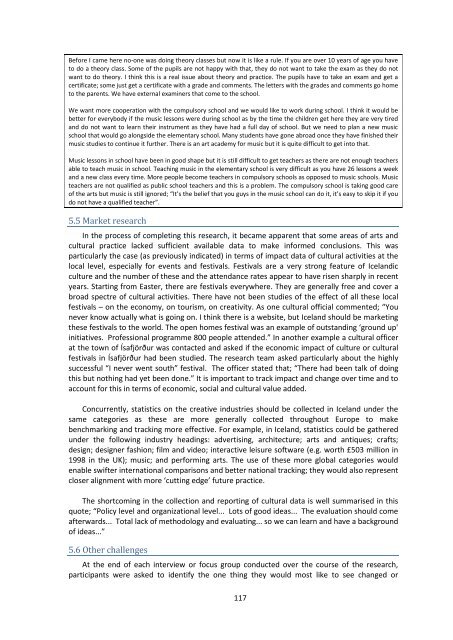
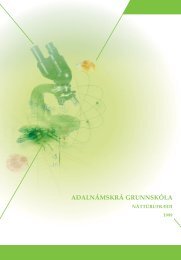
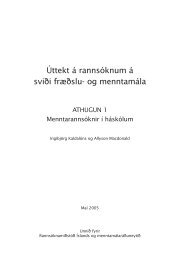
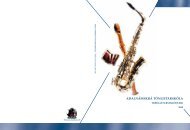
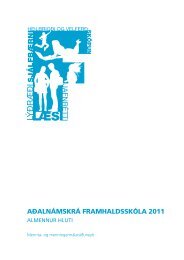
![Aðalnámskrá tónlistarskóla : rytmÃsk tónlist [Eingöngu á rafrænu formi]](https://img.yumpu.com/50843672/1/184x260/aaalnamskra-tanlistarskala-rytma-sk-tanlist-eingangu-a-rafranu-formi.jpg?quality=85)
